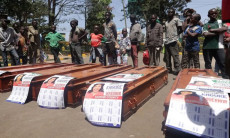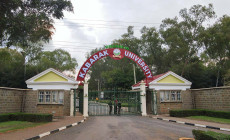- Sunday, November 2, marked the International Day to End Impunity for Crimes Against Journalists
- The theme, Chat GBV: Raising Awareness on AI-facilitated Gender Based Violence Against Women Journalists, could not have come at a more urgent moment.
Sunday, November 2, marked the International Day to End Impunity for Crimes Against Journalists. In Kenya, the national commemoration unfolded on Monday, November 3, 2025, at Sarova Woodlands in Nakuru.
The theme Chat GBV: Raising Awareness on AI-facilitated Gender-Based Violence Against Women Journalists could not have arrived at a more urgent moment.
It reminded us that behind every headline and every broadcast is a human being whose safety, dignity, and fundamental rights must never be negotiable.
Yet for many journalists, especially women, harassment, intimidation, and violent attacks have become part of their working reality.
Read More
The case of Nakuru journalist Catherine Wanjeri remains a painful example. When a journalist is attacked, it is never a single violation—it is a chain of broken rights collapsing all at once.
When a journalist is assaulted, it is not merely their work that is violated. It is their freedom of expression under Article 33 of the Kenyan 2010 Constitution, their media freedom under Article 34, and their right to access information under Article 35.
For women, who often face gendered threats, the protections in Article 29 on security and dignity become even more urgent.
Article 21, which obligates the state to protect every individual, suddenly becomes more than legal text. It becomes a test of whether the state can safeguard its citizens especially those who serve the public by gathering and sharing information.
The national values under Article 10 are also undermined when journalists cannot carry out their work freely and safely. For women journalists, these violations often carry an added layer of gender-based targeting making the event’s theme not just relevant, but necessary.
Martin Masai, trustee of the Kenya Editors Guild, captured the weight of this reality: “When journalists are silenced, injustices deepen and citizens are left in darkness.”
Christine Kuria, Deputy Executive Director of Katiba Institute, echoed the concern: “When journalists are silenced, it infringes on the public’s right to information.”
The safety of journalists is directly tied to the public’s ability to know, to question, and to hold power accountable. If journalists are insecure, then truth becomes inaccessible and with that, democracy itself begins to dim.
In other words, an attack on a journalist is not only an attack on one professional. It is an attack on the entire society that depends on their work.
James Njogu, Acting Secretary General of the Kenya National Commission for the United Nations Educational, Scientific and Cultural Organization (UNESCO), underscored this truth: “There is no democracy without press freedom, and no press freedom without safety of journalists.”
This point carries even more urgency when viewed against Kenya’s declining global press freedom ranking. As Media Council of Kenya (MCK) CEO David Omwoyo noted, the country dropped from 69th in 2022 to 117th in 2025. This is not just a statistic—it is an alarm bell.
When journalists face harassment, the cost is not only personal. It affects the depth of our public conversations, the strength of our institutions, and the credibility of our democracy.
If we want a democratic society grounded in the national values of Article 10, then safeguarding journalists must be treated as a national priority.
Protecting them is not doing them a favor. It is protecting the public’s voice, the country’s democratic fabric, and the truth itself.
Stay connected with us on WhatsApp and X for instant updates and breaking news as it happens.










